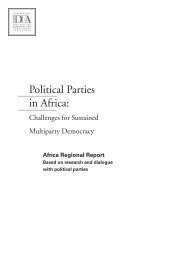Seminar Report The role of Political Parties in Democratic Transitions
Seminar Report The role of Political Parties in Democratic Transitions
Seminar Report The role of Political Parties in Democratic Transitions
You also want an ePaper? Increase the reach of your titles
YUMPU automatically turns print PDFs into web optimized ePapers that Google loves.
<strong>Political</strong> reform period (1999-present)<br />
Suharto stepped down <strong>in</strong> 1998 and a period <strong>of</strong> political reform followed with competition between the<br />
executive and the legislative powers. Before the current president Yudhoyono there were three<br />
transitional presidents who each made important contributions such as open<strong>in</strong>g space for freedom <strong>of</strong><br />
expression for the press; hold<strong>in</strong>g a referendum regard<strong>in</strong>g the <strong>in</strong>dependence <strong>of</strong> East Timor and the<br />
return <strong>of</strong> the army to their barracks. President Yudhoyono was the first president to be peacefully<br />
elected. <strong>The</strong> most important challenge now is to create a clean government and beat corruption. A<br />
democracy looses power if top executives have too much power and prerogatives.<br />
Dr Ignas Kleden emphasized the most important lessons learned <strong>in</strong> the course <strong>of</strong> political history:<br />
1. <strong>The</strong> essential th<strong>in</strong>g about democracy is that no one from outside can determ<strong>in</strong>e how the process<br />
will develop. It has to come from <strong>in</strong>side the country itself.<br />
2. It is dangerous to use an emergency situation to create democratic change. <strong>The</strong>re is a risk that<br />
emergencies are then used as a prerogative to concentrate power <strong>in</strong> one hand.<br />
3. Democracy is not a universal system but is bound to history and socially and culturally def<strong>in</strong>ed.<br />
4. <strong>The</strong> issue <strong>of</strong> politics should be <strong>in</strong>stitutionalized and not solely depend on <strong>in</strong>dividuals or great<br />
personalities.<br />
<strong>The</strong> presentation was followed by comments by the discussant Mr Aung Na<strong>in</strong>g Oo who po<strong>in</strong>ted out the<br />
similarities between Myanmar and Indonesia: both have been colonized, have/had the dual function <strong>of</strong> the<br />
army, freedom <strong>of</strong> the press, the issue <strong>of</strong> corruption and both embarked on a path towards multiparty<br />
democracy.<br />
Dur<strong>in</strong>g the ensu<strong>in</strong>g discussion, participants raised questions such as: What made Indonesia change the<br />
constitution? How did the Indonesian government ga<strong>in</strong> trust and confidence <strong>of</strong> the people? Should<br />
aspirations for change come from the dom<strong>in</strong>ant party or from other political parties?<br />
Mr Ignas Kleden stated that the idea <strong>of</strong> political change cannot be decided <strong>in</strong> a certa<strong>in</strong> po<strong>in</strong>t <strong>in</strong> time but it<br />
is a longer process. <strong>Political</strong> parties can ga<strong>in</strong> trust and confidence <strong>of</strong> the people when the set a good<br />
example and do what they promise.<br />
1.5. Summary Presentation on “Peaceful <strong>Political</strong> Accommodation: the case <strong>of</strong> South Africa”<br />
By Mr Shaun Mackay, South African Researcher and <strong>Political</strong> Analyst<br />
Discussant: Mrs Ma Thida (Sanchaung), writer and political commentator<br />
In this presentation, Mr Shaun Mackay, South African Researcher and <strong>Political</strong> Analyst presented the<br />
ma<strong>in</strong> challenges that were at the heart <strong>of</strong> the dialogue <strong>in</strong> South Africa's negotiated transition.<br />
At the start <strong>of</strong> the process, South Africa was a closed society with a white oppressive government, where<br />
blacks lived <strong>in</strong> reserved areas, 70% <strong>of</strong> the land was owned by 5% <strong>of</strong> white landowners and no space<br />
existed for opposition groups to engage politically. A ban on political parties and deeply entrenched racial<br />
and ethnic divisions existed as a result <strong>of</strong> a deliberate policy <strong>of</strong> divide and rule <strong>in</strong>stalled by the apartheid<br />
regime and violent armed resistance.<br />
<strong>The</strong> transition process can be characterised as a triple transition: from apartheid to democracy; from a<br />
closed to an open economy; and, from armed conflict and military regime to a civilian regime. It started<br />
with the release <strong>of</strong> a large number <strong>of</strong> political prisoners, <strong>in</strong>clud<strong>in</strong>g (black opposition leader) Nelson<br />
Mandela. <strong>The</strong> structure chosen to negotiate the political settlement was a national convention (CODESA),<br />
<strong>in</strong> which all registered political parties (allowed after the lift<strong>in</strong>g <strong>of</strong> the ban) were represented <strong>in</strong>clud<strong>in</strong>g<br />
armed resistance forces. This process was fully <strong>in</strong>clusive because it was politically impossible to take<br />
decisions on the whole <strong>of</strong> the nation without <strong>in</strong>volv<strong>in</strong>g all stakeholders. Decisions were made by<br />
consensus. This caused problems and to break the deadlock, an <strong>in</strong>novative solution was found to move<br />
the process forward <strong>in</strong> the form <strong>of</strong> the ‘’sufficient consensus formula” by which a sufficient number but not<br />
all people/groups agree (rather than an absolute consensus where all must agree).<br />
7
















